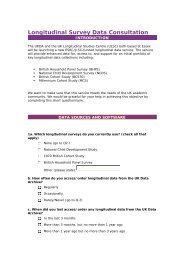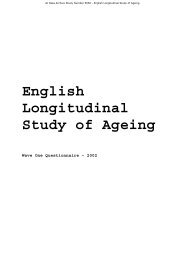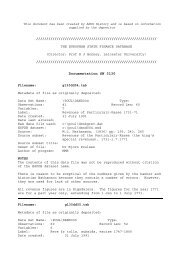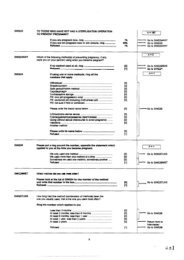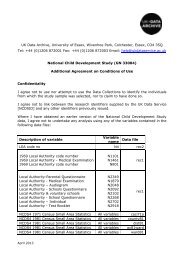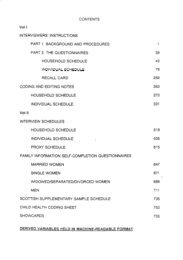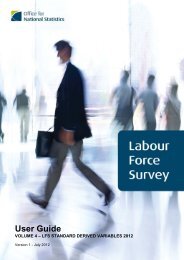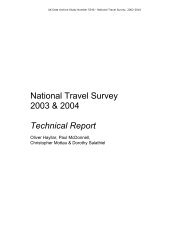The Seven Principles of Public Life - ESDS
The Seven Principles of Public Life - ESDS
The Seven Principles of Public Life - ESDS
Create successful ePaper yourself
Turn your PDF publications into a flip-book with our unique Google optimized e-Paper software.
opinions had been influenced by external events were in a minority, these issues figured<br />
prominently among those that they mentioned as having had a bearing on their views.<br />
More generally, the influences that respondents cited are suggestive <strong>of</strong> a shift in<br />
emphasis from sleaze to spin as the key public concern in relation to standards in<br />
public life. <strong>The</strong> fact that the examples respondents gave almost invariably, if predictably,<br />
involved the alleged misconduct <strong>of</strong> those in public <strong>of</strong>fice reflects the emphasis on<br />
misconduct in media coverage <strong>of</strong> standards issues. If people’s perception <strong>of</strong> the media as a<br />
key influence on their opinions is accepted as being valid, it follows that a potential<br />
consequence is for the public to have exaggeratedly negative perceptions <strong>of</strong> how those in<br />
public <strong>of</strong>fice behave.<br />
2 Trust in public <strong>of</strong>fice holders<br />
<strong>The</strong> findings in this survey reflect patterns found elsewhere in research on trust in public<br />
<strong>of</strong>fice holders, notably that people express higher levels <strong>of</strong> trust in ‘frontline’<br />
pr<strong>of</strong>essionals and those whom they perceive to be impartial or independent than<br />
they do in senior managers and administrators and those whom they perceive to be<br />
politically motivated.<br />
When asked to say which <strong>of</strong> a number <strong>of</strong> pr<strong>of</strong>essions – including a range <strong>of</strong> senior public<br />
<strong>of</strong>fice holders and other pr<strong>of</strong>essions – they trusted to tell the truth, more than three-<br />
quarters <strong>of</strong> respondents said that they trusted doctors, head teachers, judges and local<br />
police <strong>of</strong>ficers, while only a quarter said that they trusted MPs and government ministers.<br />
Levels <strong>of</strong> trust in other types <strong>of</strong> public <strong>of</strong>fice holder – senior police <strong>of</strong>ficers, NHS<br />
managers, local councillors, senior civil servants and local authority managers – fell in<br />
between these two extremes.<br />
Interestingly, there was a significant gap between the proportion <strong>of</strong> respondents who said<br />
that they trusted their local MP (47 per cent) than said that they trusted MPs in general (27<br />
per cent). This might be seen as an indication that people trust party politics at the<br />
national level considerably less than they trust MPs in their constituency role.<br />
Levels <strong>of</strong> trust varied by age and educational attainment. Trust in most pr<strong>of</strong>essions was<br />
higher among young adults (aged 18-24) and those with higher education qualifications and<br />
lower among those with no educational qualifications.<br />
6 BMRB International Report: Survey <strong>of</strong> public attitudes towards conduct in public life





